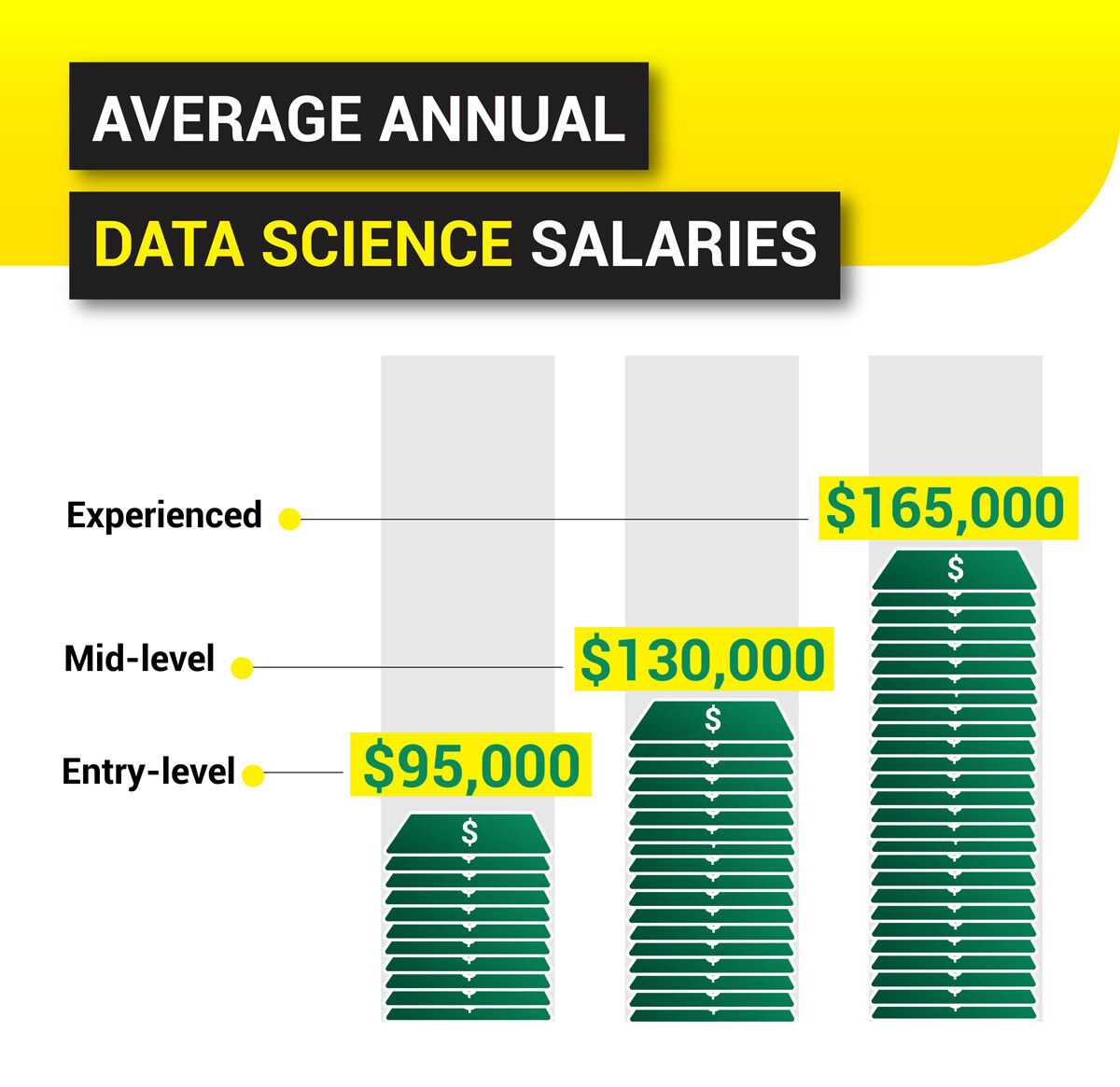Technology is speeding up processes and easing the completion of vital transactions. This has led to the rapid growth and establishment of tech companies. Data processing and technology generates jobs for many people all around the world. If you have a knack for handling data, the great news is that you can pursue a career in the expanding field of data science.
Nexford provides great support in career planning and guidance to help you map out your career path. In this article, we look at the careers in the data science field, and how best to get started.
What is Data Science?
Oracle defines data science as the science of extracting value from data. It encompasses several fields, such as statistics, data analysis, and even Artificial Intelligence (AI). Broadly speaking, data science roles involve collecting data, preparing it for analysis, and making meaningful interpretations.
Some data sources are fairly straight forward to process, while others may need to be “cleansed” or combined with data from other sources before analysis. The data you review and process can be used for different purposes, including making important business decisions and formulating forecasts.
Why do we study data science?
Digitalization of data means organizations and companies have to back-up years’, and even decades’, worth of data. This has led to the creation of big data, which is hard for traditional data-processing software to analyze.
Organizations use their big data in making decisions regarding business operations. However, gaining insight and finding solutions from overly complex big and unstructured data can be problematic.
Organizations must search for new ways to find solutions to this problem. This is where data science comes in.
The field of data science brings together different skills to analyze and process data in large data sets. This enables organizations to pick out the information they need to solve problems and challenges, or to make decisions.
Career Paths in Data Science
Data science is a successful career path wherever you are in the world. In fact, Glassdoor names data science as one of the most desired careers in the US alone. It is a broad and robust career field, which is growing fast.
Data Scientist
A data scientist processes data, analyzes it, and uses it to provide insights to their company. They work with big data, and use their skills in computer science, math and statistics. The data they manage is wide-ranging. It includes processing information from social media and other areas that are not part of the company database.

The data scientists look for trends, apply specific knowledge about their industry, and expose faulty assumptions. They are able to handle data sets from large and complex data, and use them to develop models that help companies manage their processes and challenges.
The data scientist’s findings directly influence company strategies that help their organization respond effectively to business needs.
On average, data scientists earn $100,600 a year. However, the salary depends on experience.
-
An entry-level data scientist usually earns around $95,000 a year.
-
A mid-level data scientist has an annual median salary of $130,000.
-
An experienced data scientist has a median salary of $165,000 per year.
With more and more companies digitizing their data, the demand for data scientists will continue to grow. In fact, the US Bureau of Labor Statistics (BLS) forecasts that the demand for data scientists will increase by approximately 28% between 2021 and 2026.
This is a huge opportunity for people who have skills in deriving solutions and strategies from sets of data.
Data Analyst
Data science is irrelevant if you can’t understand the data. This is where data analysts come in. A data analyst converts the data they gather into information that decision makers and managers can fully understand.
They use visual tools such as graphs and charts to present their information. In addition, data analysts make suggestions and recommendations based on the data presented.
A data analyst in the United States earns an average of $44,200 per annum. This can start from $36,200 for entry-level positions, and can go up to as much as $77,200 for experienced data analysts.
Like data scientists, the demand for data analysts is growing faster than supply. Companies and organizations need data analysts, especially those who have valuable experience. This role is one of the most sought-after in data science.
Data Engineer
Instead of formulating solutions to problems through analyzing data, data engineers work with the storage, retrieval, and processing of large data sets. They also develop tools for organizations to use when dealing with the data they sort and store.
They perform two methods of processing on the data: batch processing or real-time processing. In short, data engineers are responsible for creating an ‘ecosystem’ of data within the organization.
They make sure that data is accessible to all authorized individuals, including data scientists.
Current figures show that a data engineer earns an average of $109,700 per year. Experience, certifications and education, relevant training, and skills all factor into the final salary figure for each individual.
For an entry-level data engineer, the salary could be around $91,800. A data engineer with several years of experience can have an annual salary up to $128,000.
DICE’s 2020 Tech Job Report named data engineering as the fastest-growing job in 2019. This growth will likely continue in the coming years, as it is predicted to grow by 50% year on year.
If you are into creating networks of data rather than analyzing and interpreting them, becoming a data engineer is for you.
Machine Learning Engineer
Skilled in software development, machine learning engineers (MLEs) are responsible for developing AI, big data tools, and other similar technologies. These technologies are used in creating data funnels – analyzing the steps in a process to reach a defined goal.
They also deliver solutions for software processes. Machine learning engineers run tests on systems to test performance and functionality. They make sure that software programs can store, process, and analyze large quantities of data and information effectively.
A machine learning engineer earns an average of $140,000 a year. Entry-level machine learning engineers have salaries starting at $112,000, and the salary for an experienced machine learning engineer can reach $184,500.
Organizations and companies are using Artificial Intelligence to solve their automation and augmentation problems.
This turn to AI has increased the demand for machine learning engineers. Indeed.com positions machine learning engineers in the number 1 slot in The Best Jobs in the US in 2019.
Business Intelligence Manager
Using a variety of data sources, a business intelligence manager makes recommendations to other managers and top level executives to improve business operations.
They use economic forecasts, statistics, consumer feedback, and machine learning in exploring ways to increase profits, as well as improving employee performance. They also analyze data to develop marketable and in-demand products and services.
The median salary for a business intelligence manager is $137,200 per year. While there is some variation depending on experience, the figures are all in a similar ballpark: a business intelligence manager with one to two years’ experience can expect around $132,600 per year, while a manager with ten years’ experience may be on a salary of around $140,000 a year.
Experts anticipate that the demand for business intelligence managers in the job market will grow by 11% between 2018 and 2028. It is also expected that business intelligence managers who have broader skills that include data mining and data analytics will be highly sought after.
Data Architect
A data architect finds ways to improve the performance and functionality of existing systems. They ensure database administrators and analysts can access these systems with ease. They are also responsible for ensuring data solutions for multiple platforms are designed for optimal performance. They enable the smooth running of data analytics applications.
The BLS predicts that the demand for data architects will grow by 8% from 2020-2030. On average, a data architect earns $118,900 a year. The exact salary, as with other jobs, depends on several factors. For example, an entry-level data architect can earn a salary of $80,000 a year. With years of experience, you might earn approximately $169,000 a year.
Infrastructure Architect
Infrastructure architects, or computer network architects, design and implement information systems to align with an organization’s existing initiatives and infrastructure.
They also check if the existing systems complement the organization’s requirements and goals. Infrastructure architects assess if systems are operating optimally, and make sure systems can support new technologies and wider system requirements.
An infrastructure architect has a median salary of $137,000 per year. Entry-level positions can earn as much as $115,000 which can increase to $170,000 with experience.
The ongoing digitalization of organizations means a growing demand for infrastructure architects. It is expected that demand for these jobs will grow by 5% between 2018 and 2028. This will create job opportunities for nearly 20,000 infrastructure architects in US businesses alone.
Applications Architect
Requiring a high level of expertise in software, applications architects design the major aspects of an application’s architecture. This includes the user interface, infrastructure, and middleware. They also perform design and code reviews to make sure that design standards are met and maintained.
An applications architect aligns technology with an organization’s strategies in order to accomplish its objectives and goals. An applications architect needs to understand all aspects of the organization as well as technology itself.
The yearly average salary of an applications architect in the US is around $130,000. With experience, relevant training, certifications, and other factors, your salary can reach $175,000 a year. An entry-level applications architect can expect to earn as much as $99,900 per year.
Falling into the category of software developers, the demand for applications architects will increase by 22% between 2019 and 2029, according to the BLS. This is much faster than the national average, reflecting the increasing reliance on software and applications in every aspect of our lives.
Pursuing a Career in Data Science
Our digitized society is making a career in data science a wise choice for individuals around the world, and demand is set to outpace supply over the coming years. In addition, the field is well-suited to remote work, and companies are increasingly prepared to outsource this work to international teams or individuals. But how do you begin to pursue a career in this field?
The best first step is to get a bachelor’s degree in Information Technology or a related subject. Over 80% of workers in the field have a related degree, and at most job levels you can expect your base salary to increase with further education.
There are also courses and programs that will help you jumpstart your career in a particular area of data science. One such course is the MBA program in Advanced AI at Nexford University.
The courses can help you develop skills needed in making informed decisions regarding business matters, as well as knowledge of AI.
In addition, you will develop an understanding of the design, data analytics tools, and translators. You will learn how to communicate complex data to different individuals in the organization.
An MBA will give you a competitive advantage in the data science job market. This provides you with the necessary soft skills, and technical knowledge, that will help you boost your credentials when you go job hunting.
An MBA also promotes lifelong learning, giving you skills to continue to develop learning in the rapidly developing area of data science.
Subscribe to our newsletter
Don't miss out on our latest updates.
Unlock Your Potential: Explore Our Programs
Invest in yourself and your future. Discover our range of degrees, courses, and certificates to achieve your goal







